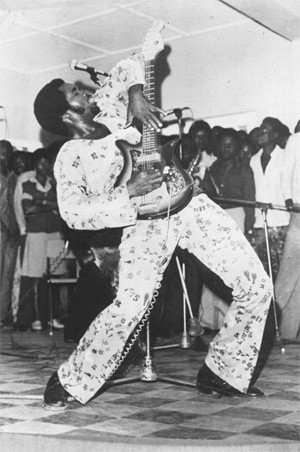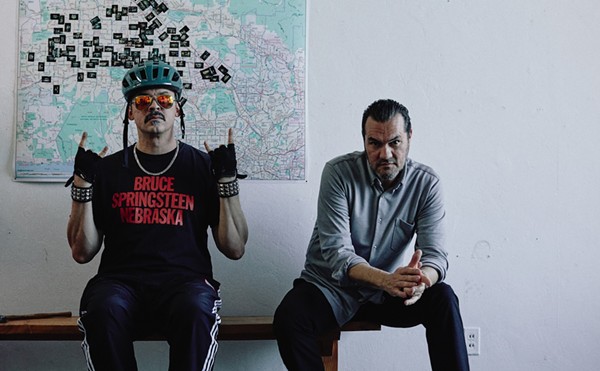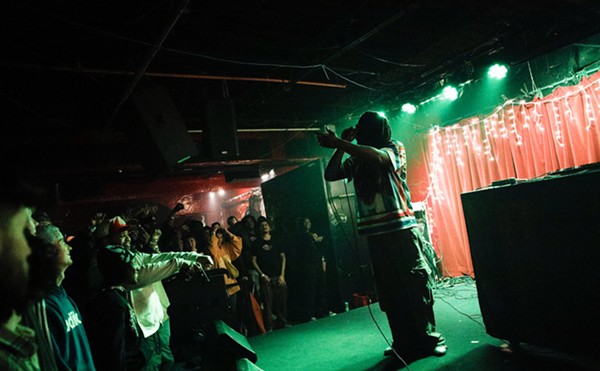In the early 1970s, Nigeria was ready for its close-up. The African nation had just prevented its eastern province from seceding and was experiencing a boom in its oil industry. Life was good, the people were ready to party, and across the country, bands sprang up to provide locals with a soundtrack.
Thirty years later, the U.K.-based Soundway label has unearthed a bunch of these recordings on a trio of new compilations: the two-CD Nigeria Special, and two single discs, Nigeria Disco Funk Special and Nigeria Rock Special. Think Vampire Weekend, but a hell of a lot funkier.
"Since record sales were going up month after month, record companies were becoming more confident about giving deals to smaller bands," says Soundway owner Miles Cleret. "The 45 was still going strong. The beauty of that was that bands would be given a one-45 deal, and that was their chance to do something."
U.S. music geeks are familiar with two Nigerian music-makers: Fela Kuti and King Sunny Adé, neither of whom is represented on these new CDs. The still-touring Adé plays juju — a guitar-driven style that mingles dub effects, talking drums, and a tropical sway with gentle vocals and a generally life-affirming party vibe. On the other hand, Kuti, who died of AIDS in 1997, combined explicit, name-naming political lyrics with free-jazz saxophone and churning, James Brown-like funk rhythms. He was repeatedly hassled by the government for his 20-minute Afrobeat jams — like "Sorrow, Tears & Blood," "Zombie," and "Teacher Don't Teach Me Nonsense" — and often ended up in jail.
Most of the music on the Nigeria Special compilations avoids Fela-esque ranting. Bands like Popular Cooper & His All Beats Band, Dan Satch & His Atomic 8 Dance Band of Aba, and Bongos Ikwue & the Groovies didn't want to stop the party, let alone bring down the government. The superb liner notes by Cleret paint a portrait of a thriving polyglot city where everyone relentlessly craved new sounds and thrills.
Electric guitars dominate Nigerian music. But there's a huge distance between the lilting, almost Hawaiian slide and muted trumpet of Celestine Ukwu & His Philosophers National's "Okwukwe Na Nchekwube" (on Nigeria Special) and the scorched acid-rock soloing of the Hygrades' "In the Jungle" (on Nigeria Rock Special). Vocals run the gamut from call-and-response chanting in Dele Ojo & His Star Brothers Band's "Oja Omoba" to the garage-rock yowling of Joe King Kologbo & His Black Sound's "Another Man's Thing," which is sort of a mid-'70s Afro-punk prequel to "O.P.P."
Cleret's favorite artist of the period is singer-guitarist Sir Victor Uwaifo, whose genteel voice and bluesy picking kinda make him the B.B. King of the Nigerian highlife style. His "Osalobua Rekpama" is one of the highlights on Nigeria Special.
"He's always been an enigma in Nigerian music, and I just find an extraordinary amount of joy in his music," says Cleret. "I've met the guy, and he's a wonderful bloke. He's the guy I can listen to over and over, more and more. That's what happens with music: Things shock and amaze you the first time you hear them, but the things that stand the test of time are the ones that shine, the more you put them on."
Only someone genuinely passionate about music would put in the time and effort that Cleret has. "You search around markets, you go to people's houses, you find old DJs, old producers, distributors, and piece together what you can from anybody that might have been working at the record companies at the time," he says. "It's real detective work."
More important, Cleret makes sure to officially license every recording he uses. Screwing artists out of their money isn't just something practiced by Western record companies; African labels do it too. "Quite often it's a case of [the company] actually telling musicians to go bang on the door and demand the money that they're owed," sighs Cleret. "It's a rotten old business."
In addition to the Nigeria Special albums, a fistful of other African-music compilations have been released since the turn of the millennium, including three excellent volumes of the Golden Afrique series, as well as Lagos Chop Up and two volumes of Nigeria 70.
With their psychedelic graphics and enthusiastic liner notes, these sets are aimed at a younger, hipper audience — not the genteel, middle-aged audience "world music" typically draws. "I was very aware that I was probably going to alienate [some] people by hitting them with some dance-floor funk and disco and heavy-rock guitars," says Cleret. "The so-called world-music crowd have always been slightly dubious of the funkier or rockier side of things.
"People are interested in music of all times and ages," he concludes. "They're always looking for something new and exciting. As the worlds of rock and funk and jazz and reggae start to dry up, people are looking for something new to excite them. Africa has a hell of a lot of surprises."













